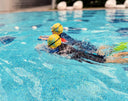Welcome to Dreamer Swim Club
Finding a Professional Swim Coach: An Insider's Guide for Parents

Choosing a private swim coach for your child is one of the most important decisions you'll make in their athletic journey. You are not just hiring an instructor; you are inviting a mentor into your child's life. But in a crowded market, how do you look past the surface and find a true professional who will build a lasting, positive impact?
As a team of lifelong athletes and coaches, we've seen it all. We believe parents deserve a more transparent look into what separates an average instructor from a truly great coach. This guide is our honest, "insider" perspective on what you should really be looking for.
1. Look Beyond "Just a Life Skill"
The first and most important question to ask yourself is: "Do I want a coach who just teaches my child a life skill, or someone who offers more?"
Almost any coach can teach a child not to sink. That's the baseline. But a professional coach sees swimming as a powerful tool for a child's holistic development. They have a deeper coaching strategy and a core belief system.
Does the coach talk about a Long-Term Athlete Development path? Do they have a clear philosophy on building confidence and resilience, not just technique? Or is their focus only on a short-term goal, like passing a SwimSafer test? While important, a test should be a byproduct of excellent coaching, not the sole purpose of it. A great coach is building your child's character, not just their checklist of skills.
2. The "Demonstration Test": A Secret Litmus Test
This is an insider tip that is rarely discussed. A professional coach must be able to swim beautifully themselves.
An experienced coach with a competitive background can spot a novice instructor in seconds, simply by watching them demonstrate a stroke. You don't need to be an expert to do this. Ask a potential coach to swim a lap of the stroke they intend to teach. Does it look smooth, powerful, and effortless? Or does it look clumsy and labored?
If you believe that demonstration is a key part of learning—and it is—then you should select someone who can actually perform the skill at a high level. A coach who doesn't truly understand the mechanics of swimming in their own body will never be able to effectively teach it to your child.
3. Ask About Their "Process," Not Just Their "Plan"
Every coach will tell you they have a plan. A professional coach can tell you about their process. This is a subtle but crucial difference. A plan is a list of drills; a process is how they adapt that plan to your unique child.
Here are some other key questions to ask:
-
"What is your approach for a child who is having a bad day or feeling scared?"
-
A great coach won't just say "I'm patient." They will talk about their toolkit of different games and drills, and their ability to pivot the lesson to focus on fun and trust-building.
-
-
"How do you measure progress?"
-
The best coaches talk about more than just speed. They'll mention milestones like "the first unassisted back float" or "mastering rhythmic breathing." They celebrate the small wins, because they know that's how real confidence is built.
-
-
"How will you communicate with me about my child's development?"
-
A professional coach will welcome a partnership with you. They will have a clear process for providing feedback and discussing your child's journey.
-
The Dreamer's Standard
Choosing a private swim coach is an act of trust. It's about finding a partner who is aligned with your values and has a deep, authentic passion for their craft. At Dreamers, this is the high standard we hold ourselves to. We believe in being transparent about our methods and our philosophy because we are confident that it is a better, healthier, and more effective way to build not just a great swimmer, but a great kid.
